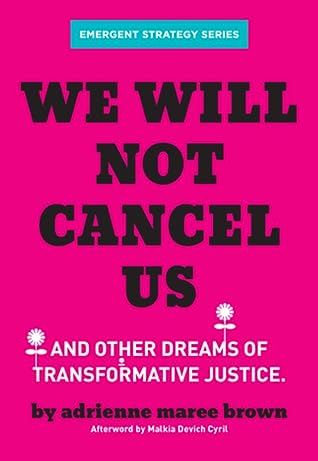More on this book
Community
Kindle Notes & Highlights
Read between
December 31 - December 31, 2021
One toxic substance is supremacy, so ubiquitous that it has long been invisible to those benefiting from it and can seem desirable to those suffering from it. It manifests as white supremacy, male supremacy, ableist supremacy, straight supremacy, cis supremacy, and more—the belief that some of us are normal, are better, are justified to take and do whatever we want, including harm each other and the earth.
I have a vision of movement as sanctuary. Not a tiny perfectionist utopia behind miles of barbed wire and walls and fences and tests and judgments and righteousness, but a vast sanctuary where our experiences, as humans who have experienced and caused harm, are met with centered, grounded invitations to grow.
I think everyone chooses each day to move towards life or away from it, though some don’t realize that they are making the choice. Capitalism makes it hard to see your own direction.
I think our movements struggle inside this larger national hopelessness and overwhelming history of trauma and shame—we are combating that which we simultaneously internalize. We want to grow, but at the same time some of us don’t seem to believe we will all get there, or get anywhere better, in time. That we can’t, and won’t, put forth the effort.
norm. Supremacy is our ongoing pandemic. It partners with every other sickness to tear us from life, or from lives worth living.
Instant judgment and punishment are practices of power over others. It’s what those with power do to those who can’t stop them, who can’t demand justice. This injustice of power is practiced at an individual and collective level.
The additional truth is, even though we want to help the survivor, we love obsessing over and punishing “villains.” We end up putting more of our collective attention on punishing those accused of causing harm than supporting and centering the healing of survivors, and/or building pathways for those who are in cycles of causing harm to change.
We need the people within our movements, all socialized into and by unjust systems,
to be on liberation paths. Not already free, but practicing freedom every day. Not already beyond harm, but accountable for doing our individual and internal work to end harm and engage in generative conflict, which includes actively working to gain awareness of the ways we can and have harmed each other, where we have significant political differences, and where we can end cycles of harm and unprincipled struggle in ourselves and our communities.
That when someone falls behind, we can use a parent’s voice of discipline, while also picking them up and carrying them for a while if needed.
I want us to ask who benefits from our hopelessness, and to deny our oppressors the satisfaction of getting to see our pain. I want them to wonder how we foment such consistent and deep solidarity and unlearning.
I think this is some of the hardest work. It’s not about pack hunting an external enemy, it’s about deep shifts in our own ways of being.
We will not cancel us. We hurt people. Of course we did, we are human. We were traumatized/socialized away from interdependence. We learned to hide everything real, everything messy, weak, complex. We learned that fake shit hurts, but it’s acceptable. Our swallowed pain made us a piece of shit, or depressed, or untrustworthy, or paranoid, or impotent, or an egomaniac. We moved with the herd, or became isolationist and contrary, perhaps even controversial. We disappointed each other, at the level of race, gender, species…in a vast way we longed for more from us. But we will not cancel us.
...more
counter-abolitionist… Instead of prison bars we place each other in an overflowing box of untouchables—often with no trial—and strip us of past and future, of the complexity of being gifted and troubled, brilliant and broken. We will set down this punitive measure and pick each other up, leaving no traumatized person behind. We will not cancel us. But we must earn our place on this earth. We will tell each other we hurt people, and who. We will tell each other why, and who hurt us and how. We will tell each other what we will do to heal ourselves, and heal the wounds in our wake. We will be
...more
ask for help, love our shadows without letting them rule our relationships, and remember we are of earth, of miracle, of a whole, of a massive river—love, life, life, love. We all have work to do. Our work is in the light. We have no perfect moral ground to stand on, shaped as we are by this toxic complex time. We may not have time, or emotional capacity, to walk each path together. We are all flailing in the unknown at the moment, terrified, stretched beyond ourselves, ashamed, realizing the future is in our hands. We must all do our work. Be accountable and go heal, simultaneously,
...more
This highlight has been truncated due to consecutive passage length restrictions.
our shared and private pain, leaving nothing unspeakable in our bones, no shame in our dirt. Each of us is precious. We, together, must break...
This highlight has been truncated due to consecutive passage length restrictions.
While all harms are not equal, even the most heinous require a way home.
The way forward is to forge abolition with both hands in the dirt, building empathy in the mirror; it’s to remember that innocence is never a prerequisite for human dignity, nor for human rights and freedom; that the words we speak aloud offer a prediction for what will be, and must therefore manifest not our smallest vision for the world, but our biggest.


